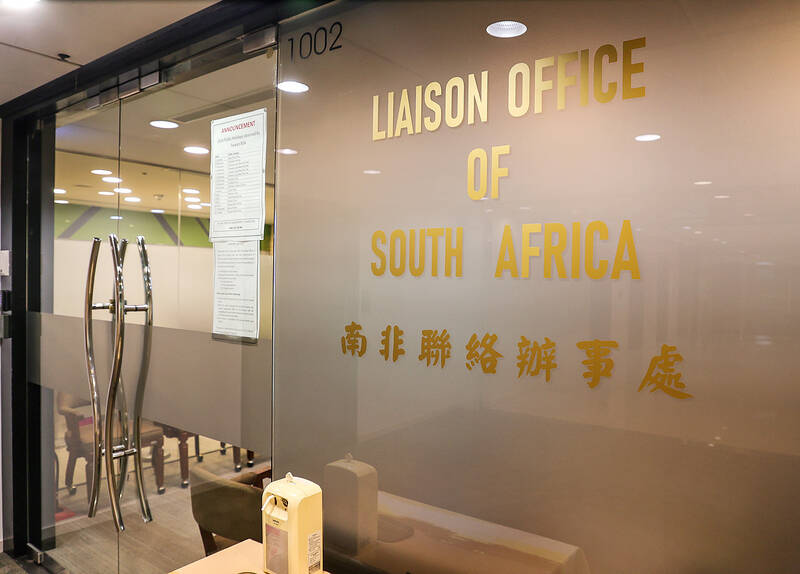The Ministry of Foreign Affairs does not rule out demanding that South Africa move its representative office outside of Taipei in retaliation for its ultimatum that Taiwan relocate its representative office to Johannesburg, a source familiar with the matter said yesterday.
South Africa on Oct. 7 issued an ultimatum via e-mail to Taiwan to move its representative office out of the country’s administrative capital of Pretoria by the end of this month, adding that the move was “unnegotiable,” the source said.
The ministry said that it would work out all possible responses based on the principle of reciprocity if South Africa “insists on submitting to China.”

Photo: CNA
It has also reached out to politicians who are friendly to Taiwan in South Africa and other nations to speak up on the nation’s behalf, the ministry said.
The source said that South Africa had been pressuring the Taiwan representative office to relocate since last year’s BRICS summit.
South African President Cyril Ramaphosa on Sept. 2 issued the All-Round Strategic Cooperative Partnership in a New Era joint statement with China at the Forum on China-Africa Cooperation in Beijing, in which he said that “Taiwan was an inseparable part of China.”
In April, the South African government cited UN Resolution 2758 and the “one China” policy to officially demand that Taiwan’s representative office move from Pretoria to Johannesburg.
The ministry had appealed to factions within the South African government friendly to Taiwan to assist in the matter and sought aid from like-minded countries within the G7, the source added.
Despite concerns lodged with Pretoria by those countries’ ambassadors, South Africa seemed resolute in appeasing China, they said.
Minister of Foreign Affairs Lin Chia-lung (林佳龍) had instructed agencies to formulate a response that would “uphold Taiwan’s sovereignty and dignity while observing the welfare and benefits of Taiwanese expatriates,” the source said.
In addition to demanding that the Liasion Office of South Africa relocate out of Taipei, the ministry is considering adopting more stringent measures regarding visa applications by South Africans and temporarily pausing education collaborations, they said.
The ministry would instead prioritize employing English-language teachers from long-time Taiwanese diplomatic ally Eswatini, the source said.
Another ministry source said that in 2015 and 2018, China provided loans totaling US$2.5 billion to South African state-owned logistics company Transnet and power company Eskom.
Early last month, the New Development Bank was swayed by China to offer South Africa US$5 billion in financing to improve its railways, the second source said.
These Belt and Road Initiative loans have undoubtedly deepened South Africa’s reliance on China, allowing Beijing to exert significant influence over senior officials to sway South Africa’s stance on international affairs, they said.
Additional reporting by CNA

MAKING WAVES: China’s maritime militia could become a nontraditional threat in war, clogging up shipping lanes to prevent US or Japanese intervention, a report said About 1,900 Chinese ships flying flags of convenience and fishing vessels that participated in China’s military exercises around Taiwan last month and in January last year have been listed for monitoring, Coast Guard Administration (CGA) Deputy Director-General Hsieh Ching-chin (謝慶欽) said yesterday. Following amendments to the Commercial Port Act (商港法) and the Law of Ships (船舶法) last month, the CGA can designate possible berthing areas or deny ports of call for vessels suspected of loitering around areas where undersea cables can be accessed, Oceans Affairs Council Minister Kuan Bi-ling (管碧玲) said. The list of suspected ships, originally 300, had risen to about

DAREDEVIL: Honnold said it had always been a dream of his to climb Taipei 101, while a Netflix producer said the skyscraper was ‘a real icon of this country’ US climber Alex Honnold yesterday took on Taiwan’s tallest building, becoming the first person to scale Taipei 101 without a rope, harness or safety net. Hundreds of spectators gathered at the base of the 101-story skyscraper to watch Honnold, 40, embark on his daredevil feat, which was also broadcast live on Netflix. Dressed in a red T-shirt and yellow custom-made climbing shoes, Honnold swiftly moved up the southeast face of the glass and steel building. At one point, he stepped onto a platform midway up to wave down at fans and onlookers who were taking photos. People watching from inside

Japan’s strategic alliance with the US would collapse if Tokyo were to turn away from a conflict in Taiwan, Japanese Prime Minister Sanae Takaichi said yesterday, but distanced herself from previous comments that suggested a possible military response in such an event. Takaichi expressed her latest views on a nationally broadcast TV program late on Monday, where an opposition party leader criticized her for igniting tensions with China with the earlier remarks. Ties between Japan and China have sunk to the worst level in years after Takaichi said in November that a hypothetical Chinese attack on Taiwan could bring about a Japanese

The WHO ignored early COVID-19 warnings from Taiwan, US Deputy Secretary of Health and Human Services Jim O’Neill said on Friday, as part of justification for Washington withdrawing from the global health body. US Secretary of State Marco Rubio on Thursday said that the US was pulling out of the UN agency, as it failed to fulfill its responsibilities during the COVID-19 pandemic. The WHO “ignored early COVID warnings from Taiwan in 2019 by pretending Taiwan did not exist, O’Neill wrote on X on Friday, Taiwan time. “It ignored rigorous science and promoted lockdowns.” The US will “continue international coordination on infectious